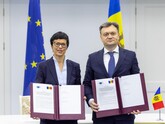
The Growth Plan Agreement for Moldova will serve as a catalyst for attracting additional investment from international financial institutions and the private sector to the country and will help create a sustainable, competitive, and inclusive economy in Moldova - the EU
This opinion was expressed by Julda Kielyte, Head of the Competitive and Inclusive Growth Portfolio at the EU Delegation to Moldova, during a press club on “The Economic Growth Plan for Moldova: between expectations and implementation – what to watch out for?” The event was organized by the Independent Think Tank Expert-Grup in partnership with the Institute for European Policy and Reforms (IPRE), the public association Institutum Virtutes Civilis (IVC), and the Friedrich Ebert Foundation in Moldova. Participants identified Moldova's economic priorities for the coming years, analyzed the content and implementation of the Growth Plan, as well as the challenges and responsibilities of state institutions and civil society. The agreement on the €1.9 billion Growth Plan for Moldova was signed on May 9 in Chisinau by European Commissioner for Neighborhood and Enlargement Marta Kos and Moldovan Prime Minister Dorin Recean. Launched by the European Commission in October 2024, the plan is the EU's largest financial and technical assistance initiative for Moldova, based on three main principles: increasing financial assistance over the next three years through a special Reform and Growth Facility for Moldova; expanding access to the EU single market; and supporting socio-economic and fundamental reforms in Moldova. Opening the event, Julda Kielyte said that the signing of the Growth Plan Agreement during the official visit of European Commissioner Marta Kos marks an important moment. According to her, this agreement will enable EU funds to act as a catalyst for attracting additional investment from international financial institutions and the private sector, thereby strengthening Moldova's transition to a sustainable, competitive, and inclusive economy. The Growth Plan is a key element of the European Union's Enlargement and Neighbourhood Strategy, which aims to promote regional stability and sustainable development. It aims to accelerate Moldova's economic growth, promote socio-economic convergence with the EU, and support the adoption of key structural reforms. At the same time, the Plan contributes to Moldova's gradual integration into the EU single market, even before its official accession. Liliana Palihovici, Chair of the Institutum Virtutes Civilis, emphasized that the reform program approved by the Moldovan government on May 7 provides opportunities for sustainable economic and social development. It includes policies for human capital development, labor market inclusion, and improved social protection. According to her, there is no doubt that Moldova needs additional resources to expand social services, align social reforms with the modernization of local public administration, and support rural development, including by expanding the map of social services. For vulnerable groups, the state must improve quality standards and expand the network of social services, ensuring a stable financial outlook and encouraging investment in this area. Adrian Lupusor, Executive Director of the Independent Think Tank Expert-Grup, noted that the Growth Plan and, indirectly, the reform agenda should catalyze structural changes in the economy that will facilitate the transition to a new model of economic growth based on higher value added. In his opinion, the reform agenda recently adopted by the government should be more ambitious and, accordingly, should be supplemented by measures that prioritize support for the business environment for investment in raw material processing, increasing the technological complexity of production processes, and introducing European standards at the company level. “We also need a more ambitious agenda in terms of consolidating quality infrastructure (more equipped laboratories) and developing the capital market (developing financial instruments, encouraging the inflow of investment funds, developing private pension funds),” he said. In turn, IPRE Research Director Stanislav Ghilețchi added that, in its current form, the indicative list of investment projects reflects an attempt to concentrate resources in areas considered to be priorities: energy, mobility, regional and local development, agriculture, and security and internal affairs. According to him, identifying these key areas is a step in the right direction towards sustainable development, especially given that Moldova suffers from an acute shortage of large projects with a transformative impact. However, the list also includes projects with low economic added value and limited strategic significance, such as building renovation, improving markets or playgrounds, implementing cultural voucher programs, or renovating courtyards of apartment buildings, and the lack of a clear and rigorous impact analysis of these initiatives could lead to inefficient resource allocation. Discussions within the press club confirmed the importance of strengthening cooperation between government authorities, civil society, and international partners to transform economic priorities into concrete, sustainable results in line with European integration goals. // 14.05.2025 – InfoMarket.







